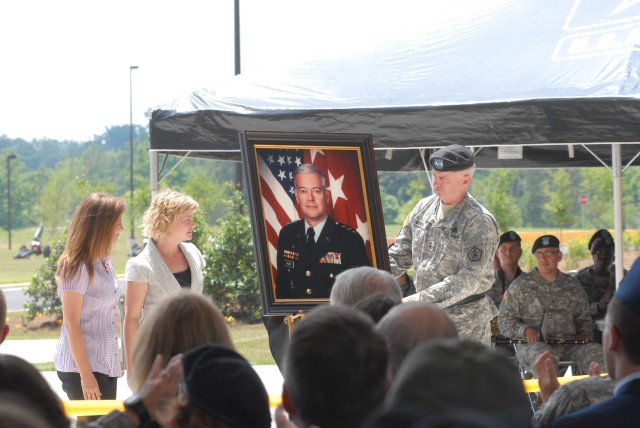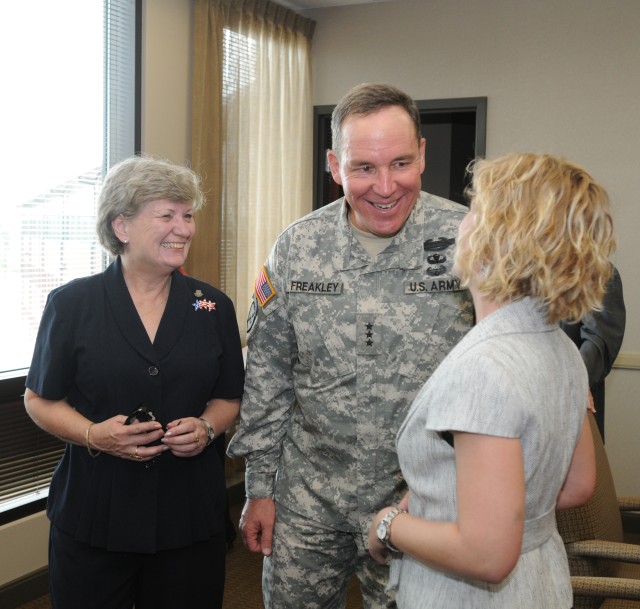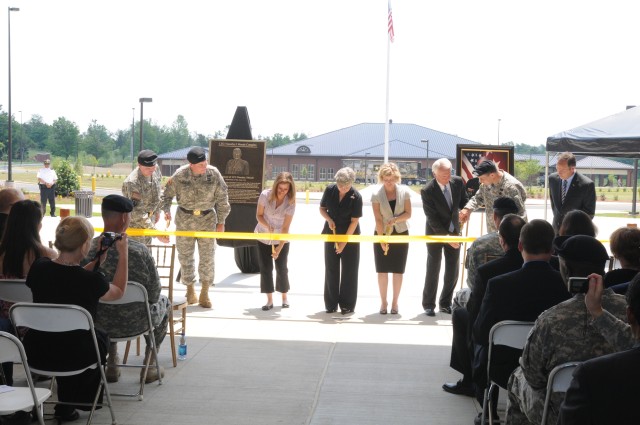FORT KNOX, Ky. -- The largest office building in the Commonwealth of Kentucky will house the Army's newest center of excellence -- the Human Resource Center of Excellence, formed by the consolidation of Accessions Command and the Human Resources Command at Fort Knox.
While the HRCOE refers to the organizations and people who work in the structure, the building itself was dedicated May 27. It was named to honor Lt. Gen. Timothy Maude, who was killed in the terrorist attack Sept. 11, 2001, on the Pentagon, where he worked as the deputy chief of staff for personnel.
Those who addressed the audience for the dedication ceremony included the Fort Knox Commander and Accessions Commander, Lt. Gen. Benjamin Freakley; Human Resources Commander Maj. Gen. Sean Byrne; Kentucky Gov. Steve Beshear; and Maude's widow, Teri Maude.
Byrne, a friend and coworker of Maude's, shared some recollections of him.
"He was my boss, my mentor, a great American, and a close friend," Byrne said. "Just as a writer leaves a book, an artist leaves a painting, and architects leave a building, Tim Maude left his vision of how we should run resources."
According to Byrne, Maude died as he lived, "working hard in the Pentagon so life would be better for men and women serving in the Army."
Maude was very aware that his job was more than policies and paperwork, but affected real, living people. Soldiers living in the mud can often seem far away from the work in the Pentagon. Byrne said Maude often presented old tin canteen cups to those he wanted to honor; it was his way of reminding them who their work was for.
"The Army lost a fine Soldier, but his vision did not die with him," Byrne said. "His vision was the blueprint for our Soldiers today."
Teri Maude described her husband because she knew him best. He was a humble man, she said, and one who often introduced himself merely by name and identified himself as a Soldier. Rarely did he reveal his rank unless pressed to do so.
She claimed her husband would be "blown away" that anyone even remembered how to spell "Maude" let alone name a building for him.
She told several stories about Maude and his career, which was essentially established in the Army because he "stood in the wrong line at the recruiting station."
He became a career officer because he needed to borrow $375 to pay Teri's tuition bill for her last semester of college. The loan officer informed him that there wasn't enough time remaining on Maude's Army commitment to allow him to repay the loan over 36 months, so he reenlisted to change his status to "voluntary indefinite."
After he had been promoted to lieutenant general, Maude told his wife that he was walking down a hallway at the Pentagon, admiring the portraits of heroes on the walls. As he walked, he realized a three-star general was approaching him, but he didn't recognize the man. Maude wracked his brain furiously to identify him so he could greet him by name. Then chagrined, he realized as the man drew nearer that it was his own reflection.
"Tim often said, 'If you do what's right for Soldiers, you do what's right for the Army,'" Teri said. "This will be a tremendous success if you remember this is about Soldiers. If you do what's right for them, you will never be wrong, and you will be doing what Tim spent 35 years of his life doing."
As a testament to Maude's life's work, Teri said his tombstone simply reads, "He took care of Soldiers."
Freakley followed Mrs. Maude at the podium.
"Army strength starts here and it will be sustained here," he said. "It makes us focus on people. As Gen. (Creighton) Abrams once said, 'The Army is not people, but the people are the Army.'"
He thanked the Louisville District of the Army Corps of Engineers, which oversaw the building project, and Turner Universal Construction for the "magnificent job."
"The building was done on time, at cost, with safety, and a love for Soldiers," Freakley said.
He then related some of the building statistics. The construction cost was $210.5 million, with another $14 million spent for furniture. The building size was 883,000 square feet requiring 3,700 tons of steel and 1.2 million man hours of labor to produce the edifice that will house 4,400 employees.
Kentucky Gov. Steve Beshear told the audience that he knew the BRAC changes would benefit the Army as well as the citizens of Kentucky.
"I knew years into the process that the Army delivers, and it delivers in a big way," he said.
He mentioned how much the state has spent to support the BRAC changes, much of it for infrastructure needs like the $100 million for transportation projects, schools, and water and sewer lines. He said he has recommended another $150 million in the budget for the next two years.
After the comments, the traditional ribbon was cut, the official portrait and dedication plaque unveiled, and the Lt. Gen. Maude complex was officially opened.






Social Sharing